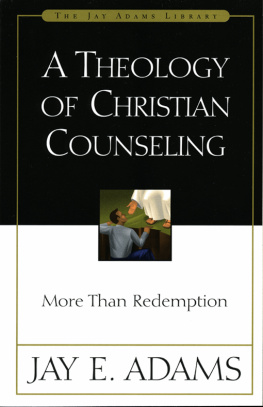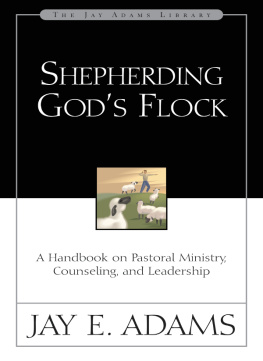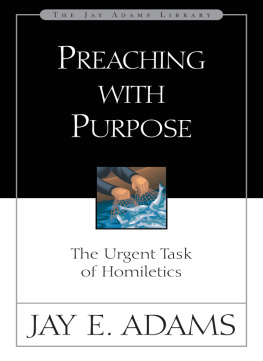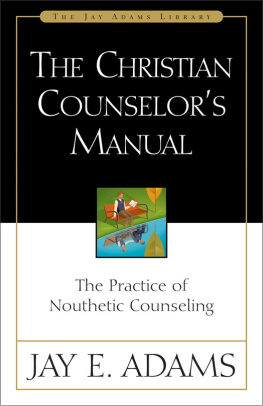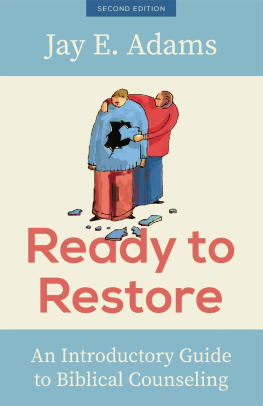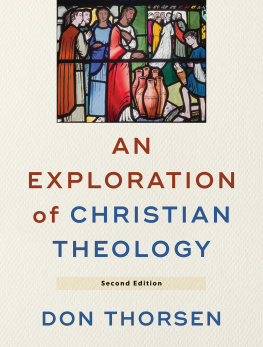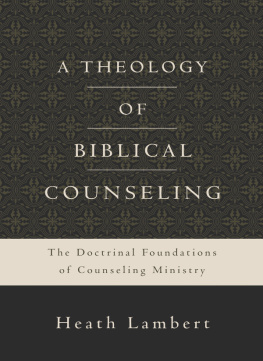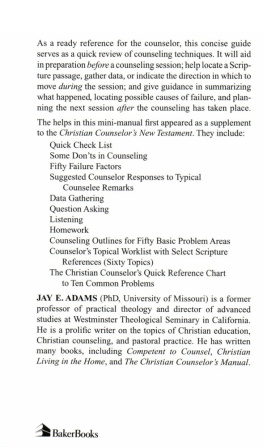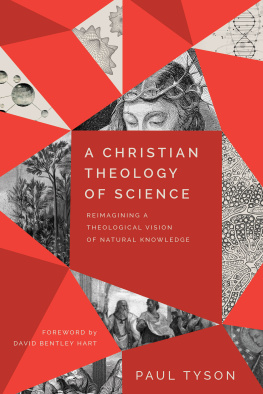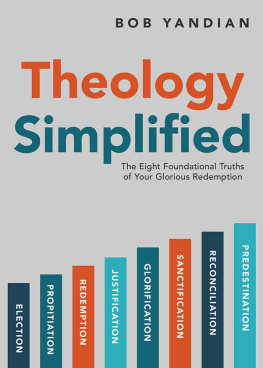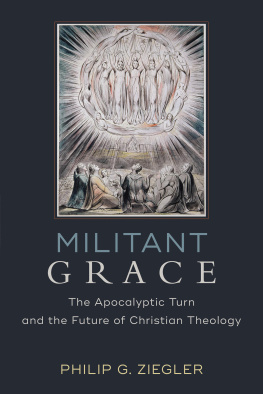Jay E. Adams - A Theology of Christian Counseling: More Than Redemption
Here you can read online Jay E. Adams - A Theology of Christian Counseling: More Than Redemption full text of the book (entire story) in english for free. Download pdf and epub, get meaning, cover and reviews about this ebook. year: 2010, publisher: Zondervan, genre: Religion. Description of the work, (preface) as well as reviews are available. Best literature library LitArk.com created for fans of good reading and offers a wide selection of genres:
Romance novel
Science fiction
Adventure
Detective
Science
History
Home and family
Prose
Art
Politics
Computer
Non-fiction
Religion
Business
Children
Humor
Choose a favorite category and find really read worthwhile books. Enjoy immersion in the world of imagination, feel the emotions of the characters or learn something new for yourself, make an fascinating discovery.
- Book:A Theology of Christian Counseling: More Than Redemption
- Author:
- Publisher:Zondervan
- Genre:
- Year:2010
- Rating:4 / 5
- Favourites:Add to favourites
- Your mark:
- 80
- 1
- 2
- 3
- 4
- 5
A Theology of Christian Counseling: More Than Redemption: summary, description and annotation
We offer to read an annotation, description, summary or preface (depends on what the author of the book "A Theology of Christian Counseling: More Than Redemption" wrote himself). If you haven't found the necessary information about the book — write in the comments, we will try to find it.
Jay E. Adams: author's other books
Who wrote A Theology of Christian Counseling: More Than Redemption? Find out the surname, the name of the author of the book and a list of all author's works by series.
A Theology of Christian Counseling: More Than Redemption — read online for free the complete book (whole text) full work
Below is the text of the book, divided by pages. System saving the place of the last page read, allows you to conveniently read the book "A Theology of Christian Counseling: More Than Redemption" online for free, without having to search again every time where you left off. Put a bookmark, and you can go to the page where you finished reading at any time.
Font size:
Interval:
Bookmark:
TO BETTY JANE
who knows how to transform
theology into life!
More Than Redemption is a first attempt to consider a biblical theology of counseling. As such it is woefully imbalanced and incomplete. No one knows this better than I. Yet, it has been my conviction over the years that, though incomplete, materials should be published whenever they can be presented in some sort of systematic form. I know of no better way to test views, provide current help for those who are struggling on the front lines and to further the goal of calling pastors back to the work that their forefathers abandoned. For those reasonsinadequate as it may beI have released this volume that you now hold in your hands.
In More Than Redemption I could take space to restate doctrinal positions that are plainly presented elsewhere by Reformed theologians; I could make observations about numerous aspects of various doctrines that are obvious to all. But this would serve little purpose and would make the book more cumbersome than it is. To note, for instance, that God must be omniscient to know all aspects of a situation in order to answer prayer, that He must be omnipresent to hear all prayers uttered at all times and in all places, that He must be omnipotent in order to respond to every circumstance in any way that He wishes and that it takes a God who is all three to bring about His universal goals through each particular in the universe in relation to every other particular both in the past and future as well as in the present, is (for example) a work of supererogation; the facts are too obvious to take the time to develop. So I havent. Similarly, many doctrinal implications for counseling, too apparent to mention or for extended comment, have been omitted or merely referred to in passing.
I mention these facts because under each doctrinal section items usually found in a volume of systematic theology have not been included. The effect, as a result, might seem somewhat spotty perhaps, but by understanding what I have done, I hope I shall relieve you of some apprehension and (indeed) help you to appreciate the fact that I assume your basic ability to develop the obvious for yourself.
The book may be read for individual benefit or may be used as a textbook in the classroom. A textbook covering such material has been needed for quite some time. Whether, in His providence, God will be pleased to use this one to meet that need, time alone will disclose. It is my hope that He will.
JAY ADAMS
All counselors have one goal in common: change. Moreover, as diverse as the various counseling systems may beand they are quite distinct fundamentally which (3) is purported to be for the benefit of the counselee.
But, N.B., these are the same three essential elements that I have shown (elsewhere) are inherent in nouthesia, the principal and the fullest biblical word for counseling.
The Bible itself provides the principles for understanding and for engaging in nouthetic counseling and directs Christian ministers to do such counseling as a part of their life calling in the ministry of the Word (other Christians also should counsel as God gives opportunity). Therefore, those who develop other systems, based on other sources of information, by which they attempt to achieve these same ends, by the very nature of the case become competitive. It is dangerous to compete with the Bible, since all such competition in the end turns out to be competition with God.
It is not that Christians oppose competition as such. That is not the problem. But when they are faithful to God, Christians must deplore any and all concepts, methods, systems, etc., that are set up in competition with Gods concepts, methods and systems. When pagan approaches are developed to do what God has given the Bible to do, these approaches must be exposed, rejected, and opposed.
At one time counseling was considered to be an integral part of the work of Christs church. Ministers wrote books on melancholy (depression), held counseling sessions with inquirers who were concerned not only with conversion but with every phase of their lives.
How, then, was it possible for the church to lay aside its God-given task so easily and turn the work over to others who proposed different ways of going about it, ways that not only differed from the biblical and I shall not repeat that story here. Rather, I should like to add one more, one that is pertinent to the very essence of this book: truths that the church does not treat systematically (i.e., theologically) it has a tendency to lose.
The pressures that had a part in compressing and shrinking the churchs counseling role were able to make headway (and indeed, all but succeeded in totally supplanting it) because, even though counseling by its nature was theological through and through, it had been carried on in an unsystematic, atheological manner.
When doctrine becomes creedal (e.g., the Athenasian Creed), it becomes defensible against (Arians and other) heretics. Heresy, as well as truth, becomes identifiable. Before it takes creedal form, however, almost any sort of heresy can claim a place. Controversy over the Bibles teaching on various points led to the formulation of theological statements that have helped us not only to identify falsehood and defend the truth, but also to teach and to restudy biblical teaching in a deeper and more profitable way. Future generations can stand on the shoulders of past ones and reach even higher on the tree of truth for fruit yet unplucked. Many doctrines have been so defined helpfully. But, to date, no serious theological (let alone creedal) statements have been made about the place or task of counseling in the Christian church.
It is my hope that out of the present controversy over the problem of eclectic counseling within Christs church (the issue is whether the counseling systems of Freud, Rogers, Skinner, not to speak of scores of others, can be brought legitimately into the church) theological studies will be generated that will lead to clearer definitions of the work of the church and her counseling ministry, so that congregations and their members will better understand the perils involved. In my opinion, advocating, allowing and practicing psychiatric and psychoanalytical dogmas within the church is every bit as pagan and heretical (and therefore perilous) as propagating the teachings of some of the most bizarre cults. The only vital difference is that the cults are less dangerous because their errors are more identifiable, since they are controverted by existing creedal statements.
It is also my hope that this theological study of Christian counselingprimitive and incomplete though it may benevertheless will provide an impetus for other such studies, leading (at length) to the sharper redefinitions and theological commitments that are so essential and yet almost entirely lacking.
We often have been told that all truth is Gods truth and that if Paul were alive today, he would have borrowed much from modern psychotherapists. Unfortunately, say they, Paul is not now alive; so the point cannot be tested. But, on the contrary, the thesis can be tested. We are not left to speculation and guessing about this matter. We can discover whether or not he was an eclectic. Paul does not live on this earth at present, nor did Albert Ellis live in Pauls day. But Epictetus and other Stoics did. And Ellis has gained much from Stoicism (Epictetus is one of his favorites). So we may ask, Did Paul borrow from Stoicism? Did he recognize truth in the system and adapt it to his work?
Listen to some quotations from Epictetus (it sounds like Ellis himself writing):
Men are not disturbed by things, but by the views they take of things. Thus death is nothing terribleDemand not that events should happen as you wish; but wish them to happen as they do happenWhat hurtsis not this occurrence itselfbut the view he chooses to take of it.
Next pageFont size:
Interval:
Bookmark:
Similar books «A Theology of Christian Counseling: More Than Redemption»
Look at similar books to A Theology of Christian Counseling: More Than Redemption. We have selected literature similar in name and meaning in the hope of providing readers with more options to find new, interesting, not yet read works.
Discussion, reviews of the book A Theology of Christian Counseling: More Than Redemption and just readers' own opinions. Leave your comments, write what you think about the work, its meaning or the main characters. Specify what exactly you liked and what you didn't like, and why you think so.

